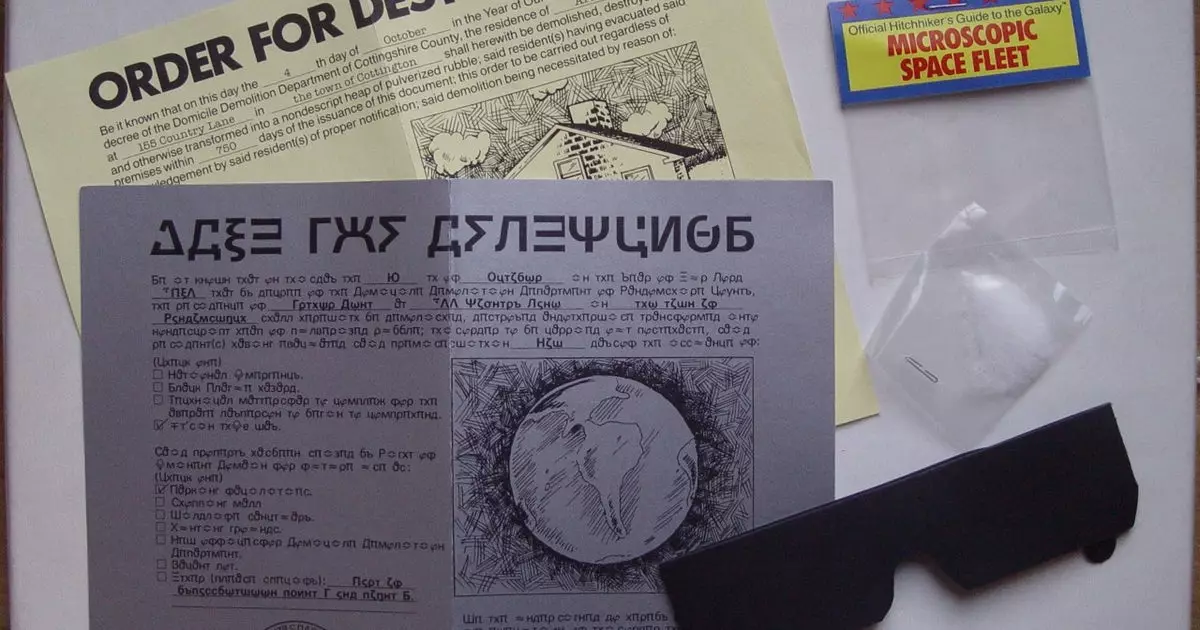In the fast-paced, digitally-driven world of modern gaming, it’s easy to overlook the quaint charm of the past. I recently stumbled upon a fascinating post by Scott Krol, who dives deep into the history of video and tabletop games, highlighting an often forgotten aspect: the inclusion of physical items, or “feelies,” with games like the 1984 classic, The Hitchhiker’s Guide to the Galaxy. Infocom’s pioneering approach to gaming not only transformed how stories were told but also added depth to the player experience with tangible extras. These feelies, which can include anything from maps to absurdly mundane but oddly charming contents—like a label that claims there’s something invisible—serve as a delightful homage to the era of whimsical game design.
The idea of feelies goes beyond mere nostalgia; it taps into a richer narrative experience that modern games often neglect. In an age where a game’s entire plot can be spoiled by a simple Google search, the thrill of unearthing hidden treasures within a game world has become increasingly rare. The joy of discovery often feels trampled beneath the weight of pre-release hype and marketing, where experiences are sanitized and listeners are forced to embrace a narrative that is far from personal. This has led me to believe that there is great value in the obscure and the trivial, things that render a gaming experience less about competitive edge and more about exploration and wonder.
Arthur Dent: An Everyman for the Ages
Victoria Regan’s insightful reflection on Arthur Dent—the unwitting protagonist of the Hitchhiker’s interactive journey—offers a fresh perspective on his character, often overshadowed by Simon Jones’ comedic portrayal. Regan elegantly unpacks Arthur’s somewhat tragic, yet empathetic nature. Her description of his decision to literally lay down his life in front of a bulldozer—an act that seemingly embodies both resignation and fierce bravery—reveals layers to his identity that are often overlooked in humor. It invites players to reinterpret their experiences as they embark on this absurdist journey.
The charming duality of Arthur’s plight—struggling against a seemingly indifferent universe while embodying an archetypal Englishman—serves as a striking metaphor for modern life. As we navigate through chaos, feeling insubstantial in a grand scheme, we often find solace and humor in our attempts to retain dignity amidst absurdity. This undercurrent of stoicism buried within Arthur’s character proves engaging, challenging us as players to rethink how we perceive our own narratives within expansive, chaotic worlds.
The Allure of the Quest for Knowledge
Regan’s reflection on her and her brother’s determination to persevere through the perplexing puzzles of Infocom’s game resonates with anyone who has found themselves lost in a game’s labyrinthine mechanics. Their quest for the hidden truths within the game offers a salient commentary on the modern gaming landscape. Nowadays, games often come pre-packaged with meticulous walkthroughs and spoilers that rob players of the thrill of discovery. I find myself yearning for an era where facing the unexpected was a challenge that was more rewarding than frustrating.
In contrast to this modern consumerism, the feelies associated with games like The Hitchhiker’s Guide to the Galaxy packed a genuine curiosity, inviting players to venture forth with an air of uncertainty. They delivered an experience that was about personal exploration rather than mere completion. This humble offering adds to the allure of what we might label as gaming nostalgia—a yearning for a time when gaming possessed an untainted sense of wonder, daring us to embrace the unknown.
Embracing Uselessness in a Chaotic Market
There’s a delightful irony in the movement towards “useless” gaming collectibles from a time when games seemed simpler yet profoundly more engaging. Today’s industry thrives on standardization; collectible statues and flashy merchandise flood the market. Yet, something about these unremarkable, almost absurd artifacts produced by Infocom transforms them into cherished memories instead of mere products. They embrace their own uselessness, seducing us to appreciate them for their quirky charm rather than their perceived monetary value.
Perhaps it is this embrace of “proud uselessness” that we need in today’s gaming culture—a reminder that it’s okay for games and their surrounding artifacts to be a little absurd and a whole lot of fun. In a world that increasingly prioritizes competitive marketability, it is refreshing to consider the value of being delightfully superfluous. Collecting strange, endearing items that challenge our perceptions of value encourages a return to innocence and curiosity in gaming. Let’s hope for a resurgence of the trivial, as we seek to ignite a spark of imagination in our virtual adventures.

